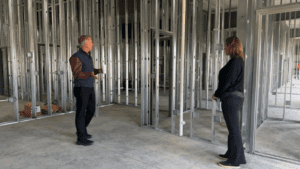By Trish Svoboda
The process of developing a new wheat variety involves years of testing by both public and private wheat breeders, focusing on all aspects of agronomic performance. The Wheat Quality Lab at Kansas State University plays a crucial role in this process, ensuring that only lines with acceptable or superior milling and baking performance are advanced.
Each year, breeders create about 800 new experimental lines, but not all meet the required flour and baking qualities. Early identification of these lines saves time and cost for further testing. The Wheat Quality Lab tests 350 to 400 advanced lines annually from the K-State wheat breeding programs. It takes five years into the breeding program to have enough seed for preliminary quality tests.
The lab uses near-infrared (NIR) spectroscopy technology to examine protein quantity and test the moisture content of the grain. The grain is then tempered and milled to separate the bran from the endosperm. The resulting flour sample is tested for color and flour production quantity. Further tests look at protein quantity and quality and dough properties.
The final step involves baking a loaf of bread and examining its quality. The results of these tests are used by K-State wheat breeders to determine which lines to advance in their breeding programs. By the time a variety is released, breeders have four to five years of quality data available.
The lab also tests 30 to 40 samples each year as a final evaluation before they are released by wheat breeders throughout the Great Plains. The results are compiled into an annual report by the Wheat Quality Council. The lab’s operations are primarily funded by the Kansas wheat checkoff, which helps support the reputation of Kansas wheat as having high-quality wheat, thereby creating more opportunities in domestic and international markets.













